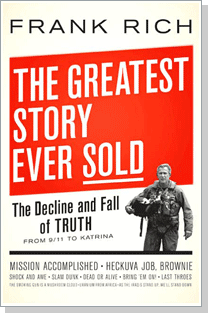 Gary Kamiya reviews Frank Rich's The Greatest Story Ever Sold in Salon today. It's a review Rich will love.
Gary Kamiya reviews Frank Rich's The Greatest Story Ever Sold in Salon today. It's a review Rich will love.A better review is Ian Buruma's in the Sunday New York Times Book Review. It's better because Buruma uses his space to point out that it took that august newspaper's former theater critic to write some of the more penetrating and accurate analysis of foreign policy to appear in the paper in recent years (Kamiya makes this point, too), and that the New York Times itself did such a poor job of independently reporting the actions of the White House that led to the war in Iraq.
So much for that canard about the New York Times as a pillar of the liberal media.
Here's Buruma:
Read the rest of the Buruma review here; read the Salon review here.Rich’s subject is the creation of false reality. “The Greatest Story Ever Sold” is not about policies, or geopolitical analysis. The pros and cons of removing Saddam Hussein by force, the consequences of American military intervention in the Middle East and the threat of Islamist extremism are given scant attention. The author, an Op-Ed columnist for The New York Times, has his liberal views, which are not strikingly original. I happen to agree with him that Karl Rove and George Bush manipulated public fear and wartime patriotism to win elections, and that Dick Cheney and his neocon cheerleaders favored a war in Iraq long before 9/11 “to jump-start a realignment of the Middle East.” Whether Rich is right to say that this has “little or nothing to do with the stateless terrorism of Al Qaeda” is debatable. The neocons may well have believed that an American remake of the Middle East was the best way to tackle terrorism.
They were almost certainly mistaken. But the point of Rich’s fine polemic is that the Bush administration has consistently lied about the reasons for going to war, about
the way it was conducted and about the terrible consequences. Whatever the merits of removing a dictator, waging war under false pretenses is highly damaging to a democracy, especially when one of the ostensible aims is to spread democracy to others. If Rich is correct, which I think he is, the Bush administration has given hypocrisy a bad name.
The Weekly Standard is not so impressed with Rich.
Last December, Bryan Curtis of Slate did a Rich-like analysis of...Frank Rich.
--Marshal Zeringue





